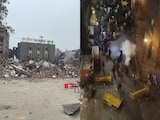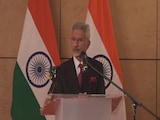Beirut:
Syrian rebels rampaged through a Sunni village in the central province of Hama on Wednesday, firing indiscriminately at civilians and killing 14 people, including seven women, state media and opposition activists said.
State news agency SANA said an "armed terrorist group" was behind the dawn attack on the village of Khatab, located 10 kilometers (6 miles) northwest of the provincial capital. SANA and Syrian state TV said 14 people were killed.
Syrian Minister of Justice Najm al-Ahmad called the attack in Khatab "a terrorist crime" and ordered a judicial inquiry.
The Britain-based Syrian Observatory for Human Rights also reported the attack, saying the rebels accused the village's Sunni Muslim inhabitants of "cooperating with the criminal regime" in Damascus. The group documents the violence in Syria through an extensive network of activists on the ground.
Sunni Muslims dominate rebel ranks and the opposition, fighting to topple President Bashar Assad's government that is predominantly made up of Alawites, a sect in Shiite Islam.
The Syrian conflict began in March 2011 as largely peaceful protests against Assad's rule. It morphed into an armed revolt after some opposition supporters took up arms to fight a brutal government crackdown on dissent. It became a civil war in which Islamic extremists, including foreign fighters and Syrian rebels, who have taken up hard-line al-Qaida-style ideologies, have played an increasingly prominent role among the fighters.
The increasingly dominant role of jihadists has dampened the West's support for the rebellion to overthrow Assad. It has also led to a backlash within rebel ranks as armed groups turned on each other, creating a war within a war in northern and eastern Syria in which at least 7,000 people, largely rebels, have been killed since the beginning of the year.
More than 160,000 people have been killed in the Syrian conflict and nearly a third of the population of 23 million has been displaced by fighting. A third of the dead are thought to be civilians.
Also Wednesday, members of Syria's main Western-backed opposition bloc elected a new president, the Syrian National Coalition said in a statement.
The new head of the exiled opposition, Hadi Bahra, served as chief negotiator at the failed peace talks with the government of Syrian President Bashar Assad in February in Geneva. Bahra succeeds Ahmed al-Jarba, who has already served two six-month terms - the maximum period allowed by the coalition.
The exiled opposition block hardly has any backing from people inside Syria. It only nominally controls nationalist-minded rebels that in many parts of the country been overrun by Islamic extremist groups, including the Islamic State group.
That group has in the past weeks captured much of eastern Syria and merged it with captured areas in neighboring Iraq - declaring a caliphate, governed by Islamic law, in the territory.
The Syrian conflict began in March 2011 as largely peaceful protests against Assad's rule. It turned into an armed revolt after some opposition supporters took up arms to fight a brutal government crackdown on dissent, then deteriorated into civil war pitting largely Sunni rebels against an Assad government dominated by Alawites - a sect of Shiite Islam.
Islamic extremists, including foreign fighters and Syrian rebels who have assumed hard-line al-Qaida-style ideologies, have played an increasingly prominent role among the fighters, dampening the West's support for the rebellion. That has led to a backlash within rebel ranks as armed groups turned on each other, creating a war within a war in northern and eastern Syria in which at least 7,000 people, largely rebels, have been killed since the beginning of the year.
More than 160,000 people have been killed in the Syrian conflict and nearly a third of the population of 23 million has been displaced by fighting. A third of the dead are thought to be civilians.
State news agency SANA said an "armed terrorist group" was behind the dawn attack on the village of Khatab, located 10 kilometers (6 miles) northwest of the provincial capital. SANA and Syrian state TV said 14 people were killed.
Syrian Minister of Justice Najm al-Ahmad called the attack in Khatab "a terrorist crime" and ordered a judicial inquiry.
The Britain-based Syrian Observatory for Human Rights also reported the attack, saying the rebels accused the village's Sunni Muslim inhabitants of "cooperating with the criminal regime" in Damascus. The group documents the violence in Syria through an extensive network of activists on the ground.
Sunni Muslims dominate rebel ranks and the opposition, fighting to topple President Bashar Assad's government that is predominantly made up of Alawites, a sect in Shiite Islam.
The Syrian conflict began in March 2011 as largely peaceful protests against Assad's rule. It morphed into an armed revolt after some opposition supporters took up arms to fight a brutal government crackdown on dissent. It became a civil war in which Islamic extremists, including foreign fighters and Syrian rebels, who have taken up hard-line al-Qaida-style ideologies, have played an increasingly prominent role among the fighters.
The increasingly dominant role of jihadists has dampened the West's support for the rebellion to overthrow Assad. It has also led to a backlash within rebel ranks as armed groups turned on each other, creating a war within a war in northern and eastern Syria in which at least 7,000 people, largely rebels, have been killed since the beginning of the year.
More than 160,000 people have been killed in the Syrian conflict and nearly a third of the population of 23 million has been displaced by fighting. A third of the dead are thought to be civilians.
Also Wednesday, members of Syria's main Western-backed opposition bloc elected a new president, the Syrian National Coalition said in a statement.
The new head of the exiled opposition, Hadi Bahra, served as chief negotiator at the failed peace talks with the government of Syrian President Bashar Assad in February in Geneva. Bahra succeeds Ahmed al-Jarba, who has already served two six-month terms - the maximum period allowed by the coalition.
The exiled opposition block hardly has any backing from people inside Syria. It only nominally controls nationalist-minded rebels that in many parts of the country been overrun by Islamic extremist groups, including the Islamic State group.
That group has in the past weeks captured much of eastern Syria and merged it with captured areas in neighboring Iraq - declaring a caliphate, governed by Islamic law, in the territory.
The Syrian conflict began in March 2011 as largely peaceful protests against Assad's rule. It turned into an armed revolt after some opposition supporters took up arms to fight a brutal government crackdown on dissent, then deteriorated into civil war pitting largely Sunni rebels against an Assad government dominated by Alawites - a sect of Shiite Islam.
Islamic extremists, including foreign fighters and Syrian rebels who have assumed hard-line al-Qaida-style ideologies, have played an increasingly prominent role among the fighters, dampening the West's support for the rebellion. That has led to a backlash within rebel ranks as armed groups turned on each other, creating a war within a war in northern and eastern Syria in which at least 7,000 people, largely rebels, have been killed since the beginning of the year.
More than 160,000 people have been killed in the Syrian conflict and nearly a third of the population of 23 million has been displaced by fighting. A third of the dead are thought to be civilians.














